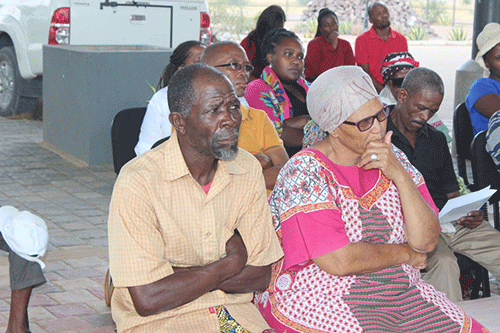Sakeus Iikela
Residents of Hoachanas, a settlement under the Mariental Rural constituency in the Hardap region, are demanding that their settlement be proclaimed a village council to enable them to administer their own affairs and improve services.
They believe Hoachanas has all the infrastructure and the population needed to qualify for local authority status.
They trust their problems of security, electricity and water can no longer be solved by the regional councillor who at times is not available to them.
“For years, the Hoachanas settlement has been in the care of a settlement administrator who has no power to solve anything. How long can we live like this? The government must tell us what the plan is for Hoachanas? The regional councillor does not attend to our problems,” a concerned resident stressed.
According to the residents, discussions to proclaim the settlement started over 10 years ago when Katrina Hanse-Himarwa was the governor of Hardap region but has not materialised since.
According to the 2011 census data, Hoachanas has a population of 3 000 inhabitants.
The settlement also has two schools, a clinic, a police station and other government services.
“We can develop our settlement with the money that we use to buy electricity and pay for other services. We have a clinic, a police station and schools. Population wise, Kalkrand is smaller than Hoachanas but Kalkrand has a village council. I am raising this because of the problems which we are experiencing with the regional council which is governing Hoachanas,” another resident said.
These sentiments were raised during an engagement with the chairperson of the National Council (NC) Lukas Sinimbo Muha on the work of the NC and parliament at large.
The chairperson’s outreach programme is designed to spread awareness and educate members of the public about the law-making process and how they can participate.
As such, Muha and his delegation, which included the secretary to the NC, advocate Tousy Namiseb conducted public engagements with various communities.
The discussions were mainly focused on the separation of powers between the three branches of government: the Executive, the Legislature and the Judiciary – and how they relate to the law making process.
In addition, the delegation also informed members of various communities on the main functions of the NC and the importance of public participation in the lawmaking process.
While in the Hardap region, Muha also visited various communities including Aranos, Daweb, Gibeon and Kalkrand respectively.
At Daweb, residents complained about the lack of economic activities and employment opportunities at their settlement.
As a result of lack of economic activities, residents say young people in the area have become victims of alcohol abuse “as they have nothing to do at Daweb”.
In addition, Daweb residents are pleading with the government to drill boreholes in their constituency to minimise the loss of livestock due to drought.
“We are really struggling for water at Daweb and we are losing livestock because of that,” a concerned resident stressed.
Furthermore, the inconsistency in the implementation of social welfare programmes such as drought relief, the social grant allocated to vulnerable people and the allowances for veterans of the liberation struggle are also some of the concerns raised by residents at Daweb.
At Gibeon, residents complained about the lack of interest by political leaders.
They said politicians only visit the area when it is election time.
“Gibeon is slowly becoming a settlement. This is demonstrated by the lack of interest in Gibeon by our political leaders. We do not even receive developmental projects anymore. Our constituency is dying and becoming irrelevant. What is the plan for Gibeon?” an angry resident asked.
The constituency has also been experiencing a serious shortage of water, which hinders the development of small-scale agriculture activities.
Residents, therefore, want boreholes drilled in their constituency to ease their water woes for human consumption and their livestock.
They suggested that the government should consider allocating fishing quotas to constituencies to enable them to solve minor issues, which are normally overlooked when the government draws up its national budget.
Concerns raised by various communities in the Hardap region will form part of the chairperson’s report, which will be tabled in the NC for discussions.
After the report is adopted by parliament, relevant authorities will then be compelled to implement its recommendations to improve the situations of the concerned communities.


